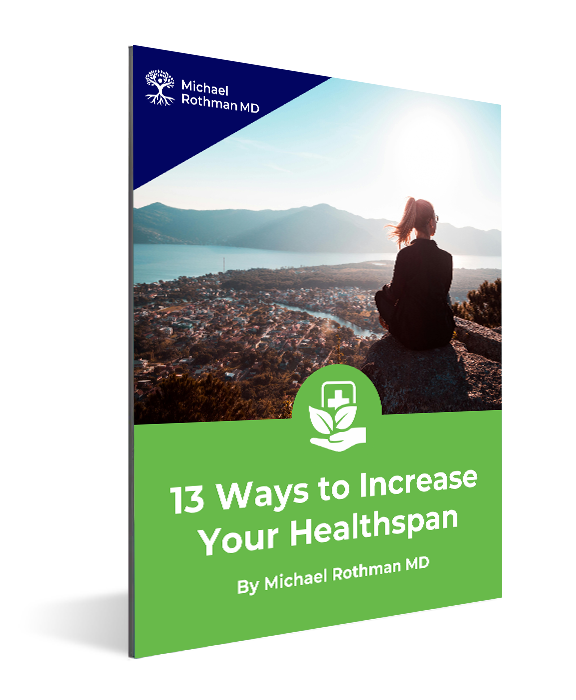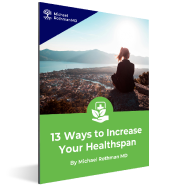Breathe a Sigh of Relief with a Natural Approach to Asthma
For the last 20 years, Michael Rothman MD has been treating patients for conditions related to autonomic dysfunction. Dysautonomia is a term used to describe a condition where your autonomic nervous system is essentially dysfunctioning. Dysautonomia literally means a dysfunctional autonomic nervous system. Every single person, at some point in time, will suffer from varying degrees of dysautonomia, yet this disorder is virtually unknown and unrecognized. We have an unseen or hidden epidemic of autonomic dysfunction and one way to combat this common, health-sapping condition is to bring awareness to this ubiquitous problem. For this reason, Michael Rothman MD will be releasing a series of blogs related to various manifestations of dysautonomia in hopes that patients suffering from these disorders will be armed with more information and follow a healthy path to get to the root cause of their chronic symptoms.
Why do I suffer from Asthma in the first place?
In short, asthmatic symptoms occur to protect your lungs from toxic particles, such as dust, pollen, microorganisms and other allergens. Consequently, your bronchioles will go into a spasm to keep the “bad guys” from getting into your lungs. Some people are more sensitive to bronchospasms than other people. If you suffer chronically from bronchospasms, you may be diagnosed as having asthma. Which leads us back to the question: “Why do I suffer from asthma in the first place?” There are numerous factors that can lead you to have chronic bronchospasms, including allergies, hormonal imbalances and chronic stress, all of which can contribute to inflammation and autonomic dysfunction.
The connection between autonomic dysfunction and asthma
Your autonomic nervous system (ANS) is responsible for controlling a multitude of physiologic processes in your body, including your heart rate, blood pressure, blood sugar levels, digestion, body temperature, muscle tone, moisture levels and much more. There are two sides of your ANS, your sympathetic nervous system (SNS) and your parasympathetic nervous system (PNS). Your SNS is better known as the “fight or flight” response, which allows you to respond to an emergency situation (via the release of adrenaline) by increasing your heart rate, blood pressure, blood sugar, opening up your airways, decreasing your digestion and drying out your nose, mouth and airways (amongst many other functions). Conversely, your PNS is your “rest, repair and digestion” response, which stimulates numerous activities completely opposite to your SNS. These vital PNS related functions tend to lower your heart rate, reduce your blood pressure, stimulate your digestive processes, increase mucus production in your airways and digestive tract, and close down your airways (amongst many other functions).
Hence, you can see that too much parasympathetic activity in your lungs will lead to an asthma attack, characterized by bronchospasms and mucus production.

Start your journey to true well-being:
The connection between chronic stress and asthma
When you are feeling stressed, your body is excessively in the “fight or flight” mode and you are constantly using your adrenaline to maintain, this hypervigilant state. Over time, your adrenal glands become relatively depleted in adrenaline, leading to elevated PNS activity and hence bronchospasms can occur. Additionally, chronic stress increases your cortisol levels, as cortisol is secreted from your adrenal cortex during a stress response. Over time, your adrenal glands can no longer produce enough cortisol. Since cortisol is an anti-inflammatory hormone, and since inflammation can contribute to an asthma attack, this is another mechanism that links chronic stress to bronchospasms.
The connection between allergies and asthma
You may have noticed that your asthma is worse when your allergies are worse; they seem to go hand in hand. During allergy season, or if you come in contact with an allergen, your airways will constrict to try and block the allergen from entering your lungs, making it difficult to breathe. To make matters worse, this same allergen will cause your immune system to release a chemical in your body known as histamine. You may start to feel stuffed up, with watery eyes, and runny nose, further worsening your ability to breathe. In this vicious cycle, the allergic reaction causes a release of histamine and when you release more histamine, this causes an increase in your parasympathetic (PNS) tone. Therefore, your ANS continues to become more unbalanced and your allergy and asthma symptoms get worse and worse.
The connection between your blood sugar and asthma
Whenever your blood sugar fluctuates you are at risk for an asthma attack. Fluctuations in your blood sugar cause a type of stress known as edibolic stress. This very common form of stress can be very easily controlled through your diet. Reducing your edibolic stress will significantly improve your overall health. You must understand that every time you indulge in something sweet, your blood sugar rises. This prompts your body in stimulating your parasympathetic nervous system (PNS) to attempt to lower your blood sugar by releasing insulin into your system. This excess PNS stimulation can actually contribute to a bronchospasms and even a full blown asthma attack.
What can I do if I’m having an asthma attack?
First, try not to panic! If you understand what is happening to you when you have an asthma attack, it may help to keep you calm. You may hear some wheezing or whistling, resulting from narrowed airways which is your body’s attempt to restrict access of the allergens to your lungs. Unfortunately, if you panic, you may start to breathe faster and faster. When you breathe too fast this is known as hyperventilation. When you hyperventilate, your body will become depleted of carbon dioxide. Since carbon dioxide acts like an acid in your body (carbonic acid), hyperventilation will make you become overly alkaline (lack of acidity). This alkaline state can actually stimulate your PNS and make your asthma much, much worse. Try to stay calm and take a puff from your albuterol inhaler. This very safe and effective medication acts like instant adrenaline, kicks your sympathetic nervous system right into gear and relieves your bronchospasms. Unfortunately, steroid based inhalers are not nearly as safe and effective as albuterol because steroids have much different effects. Steroids do not stimulate your SNS (sympathetic system in your body) and, in fact, over time, these powerful drugs can actually stimulate your PNS (parasympathetic nervous system) and worsen your asthma symptoms. To make matters worse, steroids cause your blood sugar to go up, hence also activating your parasympathetic nervous system (PNS) to lower your blood sugar through your pancreas’s release of insulin.
Ready to Take Control of Your Health?
If you’re ready to prioritize your health and are seeking effective, metabolically directed treatments, contact us online or call (732) 268-7663 for a consultation with Dr. Rothman.
I had severe asthma as a child, but why are my symptoms better as an adult?
When you were a child, your ANS (autonomic nervous system) was much more responsive than when you reached adulthood. Consider a few examples; children can have a high fever, but may feel perfectly fine, running around and playful, but an adult with a high fever would feel very sick and most likely be resting in bed. Regarding allergic reactions; when children are allergic to something, their reactions will be highly amplified. These children may have severe watery eyes, runny noses, and significant rashes. A child’s hyperactive autonomic system (ANS) can also manifest as vomiting and diarrhea much more frequently than an adult. Fortunately, many children “grow out” of asthma or allergy problems as their ANS matures and becomes less hyper reactive which leads to less asthmatic episodes.
What can I do to limit my asthma symptoms?
- You want to reduce any excessive ANS stimulation, keep your inflammation to a minimum, try to reduce chronic stress and avoid things you are allergic to. Your diet is extremely important for limiting your asthma symptoms.
- Avoid sugar in your diet. Sugar intake will cause fluctuations in your blood sugar and hence excessive PNS activation. Sugar also contributes to high insulin, weight gain, and feeds the “bad bacteria” in your gut, all of which promotes inflammation and hyperactive airways.
- Avoid fried foods, vegetable oils (like corn oil, soy oil, canola oil), food additives (like artificial colorings, flavorings, preservatives) all of which cause inflammation.
- Avoid artificial sweeteners like Aspartame and Splenda, they are very pro-inflammatory.
- Be careful when you exercise, especially in cold weather .Exercise induced asthma is common because as you breathe in and out more quickly, you actually experience a mild form of hyperventilation. Your body becomes alkaline which causes bronchiole spasms. Additional, if you overtrain, your body is hitting the “gas pedal” (fight or flight response) over and over, eventually depleting your adrenaline and shifting your body into high levels of PNS. Cold air can also contribute to bronchospasms.
- Avoid drugs that stimulate PNS (or reduce SNS). For example, prescription drugs such as beta blockers for blood pressure or heart rate control can also block sympathetic activity in your body; this drug effect increases your parasympathetic (PNS) activity.
- Avoid birth control pills (or any medications that have estrogenic effects) high estrogen stimulates your parasympathetic nervous system (PNS) and can make your asthma much worse
- Regarding exercise – be careful about over training, and avoid training in cold environments.
- Use your albuterol inhaler as needed, avoid steroid medications unless you have a life threatening situation.
- Consult with a doctor that understands human physiology and the interactions between ANS activity, diet, hormones, and immune system activity.
- Schedule a consultation with Dr. Rothman to review if your diet, your hormones, your medications, your exercise regimen, your allergies are contributing to your asthma symptoms.
Together, you can work on a plan to improve your overall health and finally breathing a sigh of relief.
Are you suffering from asthma symptoms? Come in for a consultation with Dr. Rothman by calling, 732-268-7663 and discover a natural approach to combating asthma and improving your overall health.













